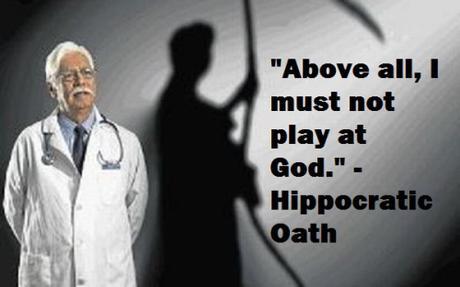
According to a report from California Catholic Daily, May 22, 2015, the state of California has added a new first to its dubious list of achievements.
Formerly opposed to physician-assisted suicide — euthanasia in non-PC parlance — last Wednesday, May 20, 2015, the California Medical Association (CMA) removed its opposition to a controversial bill in the state legislature that would allow terminally ill Californians to end their lives with doctor-prescribed drugs.
In so doing, CMA became America’s first state medical association to drop its opposition to euthanasia.
Although CMA has long opposed doctor-assisted suicide on grounds that it violates doctors’ ethical and moral obligations to provide the best treatment possible, the medical association recently changed its bylaws so that it is now neutral on the issue by deleting the term “physician-assisted suicide” and replacing it with “aid in dying.” Its rationale is that it is simply acknowledging a shift in doctor and patient attitudes about end-of-life and aid-in-dying options. Dr. Luther Cobb, president of the California Medical Association and a Humboldt County general surgeon, said, “I’ve always felt that way, but I was surprised the membership of the organization had changed.”

In January of this year, Sacramento lawmakers introduced SB128: End of Life Option Act, three months after Brittany Maynard, 29, set off a worldwide movement in support of “aid in dying” by sharing her own decision to die with the help of her doctor. Maynard, who had terminal brain cancer, moved to Oregon to access the state’s Death with Dignity law, which the California legislation uses as a model. Maynard claimed her final months were made more difficult by not being able to access life-ending drugs in her home state. She died Nov. 1, 2015, after using the lethal prescription. Her husband and mother have continued to share her story in the state Capitol to encourage lawmakers to change California’s laws so that others don’t have to move for similar end-of-life options.
SB128 would require two California physicians to agree that a mentally competent patient has six months or less to live before prescribing life-ending drugs. A terminal patient seeking the lethal prescription would then be required to make a written request and two oral requests at least 15 days apart.
Opponents of the bill argue that vulnerable people can be coerced into seeking the deadly prescription by heirs looking to profit or by health insurers who find it cheaper to offer aid in dying rather than chemotherapy to live. “It’s a bad bill because it has the possibility of impacting the most vulnerable in California who don’t have access to health insurance or the best of care and whose options are limited,” said Tim Rosales, spokesman for Californians Against Assisted Suicide.
SB128 passed along strictly party lines (Democrats for; Republicans opposed) in two Senate committees — health and judiciary. But since California voters persist in electing Democrats to a majority to the state legislature, the euthanasia bill is likely to become law.
Certainly, CMA’s move paves the way for passage of the bill, although opposition remains in the Catholic Church and among some disability rights groups.
In removing its opposition to SB128, California Medical Association had sought an amendment to the bill to ensure that doctors who did not want to participate would also not be required to provide information on assisted-dying or refer a patient to a medical provider willing to offer such services, although there will still be other sources and opportunities for patients to learn about aid in dying.
The amendments are expected to be finalized and made public this week.
~Éowyn

